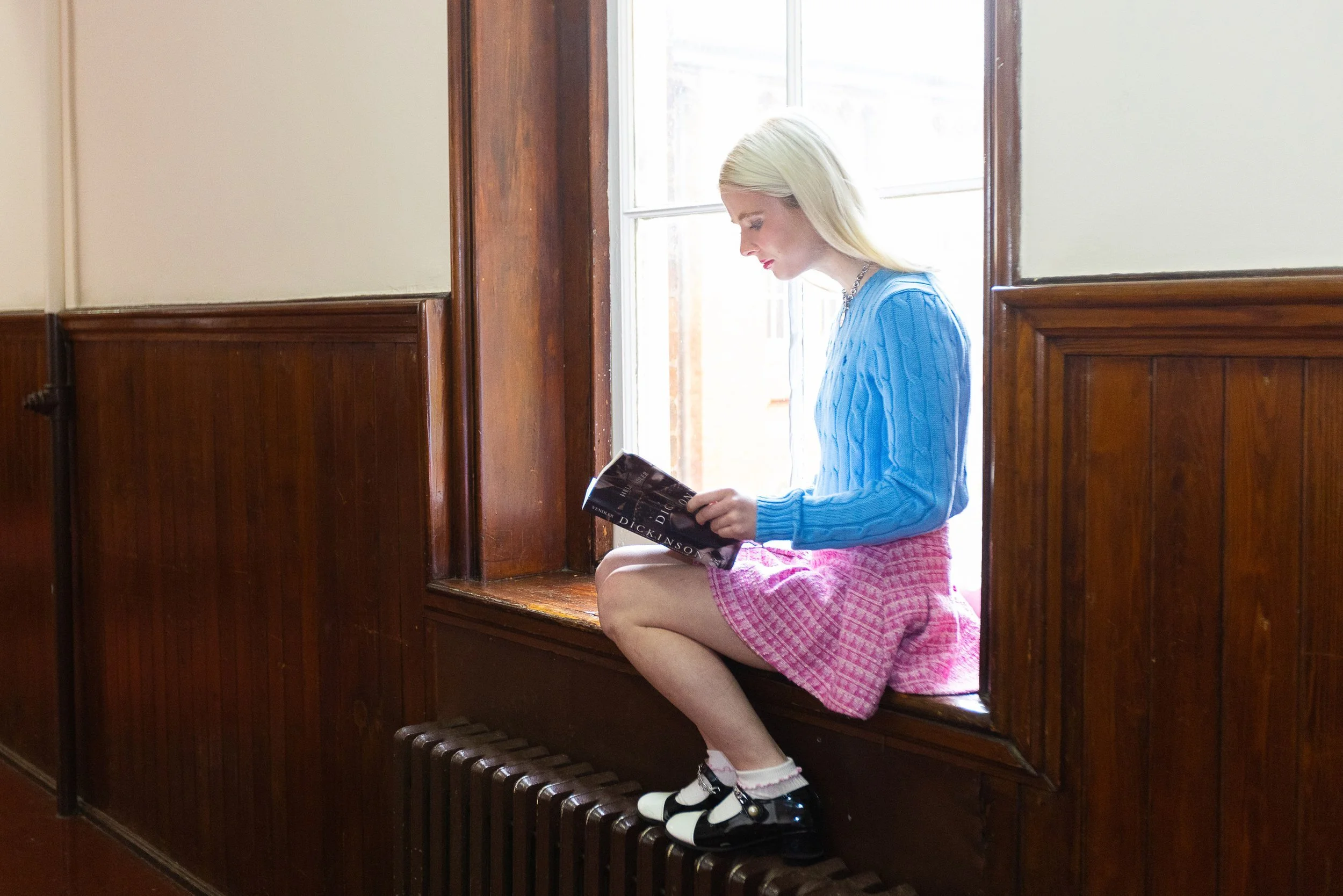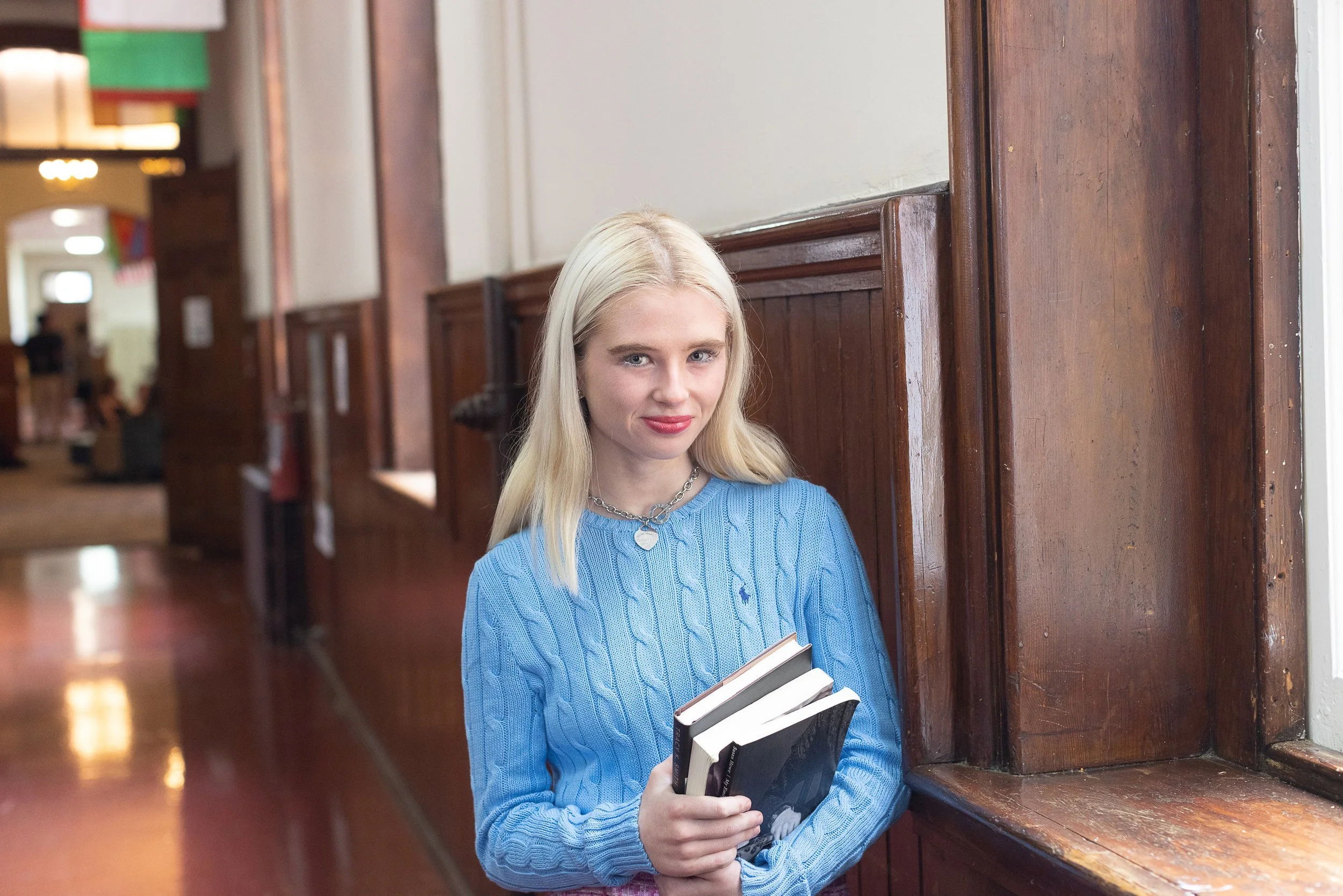Success is Counted Sweetest
Lilly Miller studying the poetry of Emily Dickinson
Lilly Miller can often be found sitting quietly on a windowsill in Old Main. Gazing through the century-old bubbled glass, Lilly is Wordsworthian in her observation of the simplicity and sublimity of the world around her. It is here she dwells in possibility. It is these moments her soul stands ajar and welcomes ecstatic experience. It is here Lilly gathers the ingredients for her poetry.
Lilly has an obsession—an obsession that dates back to elementary school. She is obsessed with meter and rhyme. She is obsessed with human experience. She is obsessed with how poets can express the most profound human emotions in verse and communicate with readers across centuries.
In particular, Lilly has always been fascinated by the poetry of Emily Dickinson. She has spent the spring semester working with Dr. Andy Eaton in an independent study exploring Dickinson’s poetry.
We sat down with Lilly to learn more about her obsession and her journey this semester.
Tell us about your independent study.
Any excuse to bake in a sunny windowsill and wrestle with poetry is well savored school time. I’ve been in the habit of developing one or two essays a week analyzing Dickinson’s work, and two or three poems using what I have learned by reading up on her writings. Dr. Eaton has been exceptionally helpful. Every week we sit one-on-one and discuss how I could make adjustments to these pieces. I call it improving, he calls it “making it more itself”.
Why is Emily Dickinson’s poetry appealing to you?
It’s an obsession dating back to at least the third grade, an obsession which my teacher at the time deemed “unbecoming”. And I think that’s the meat of it— Emily Dickinson was an “unbecoming” little girl just like me. But what’s more is that she had the power to channel those thoughts and experiences into vessels through which people very far away, centuries after her, empathize and relate to her like I do. Writing in general is used to communicate complexities of the human experience across time, space, and language. It’s always an act of empathy, always an imagining of what it's like to be someone else. So when Dickinson uses hymn meter or Shakespeare uses iambic pentameter, they aren’t doing it so your English teachers have material to torture you with; they’re doing it so that the poem can have a bigger and better life in your mind. And like these that we practice through reading and studying poetry, provide us with the linguistic tools to share our own stories with more precision. My goal is to discover these tools by dwelling in the possibilities of her work.
“And like these that we practice through reading and studying poetry, provide us with the linguistic tools to share our own stories with more precision. My goal is to discover these tools by dwelling in the possibilities of her work. ”
How has MSA’s Humanities program helped you grow as a thinker and a writer?
I’ve always had lots of little perceptive thoughts about everything; flowers, fire hydrants, cracks on the sidewalk. They buzz around my brain like bees circling a honeycomb, and for a while I just sort of let them buzz about. Now at Miller I’m taught how to filter all those thoughts into meaningful, observable representations so that other people may understand them the way I do. Maturing as a writer is not knowing “what to say”, but how to say it with more effectiveness, and I think Miller does a phenomenal job of instilling that in its students.
“I’ve always had lots of little perceptive thoughts about everything; flowers, fire hydrants, cracks on the sidewalk. They buzz around my brain like bees circling a honeycomb, and for a while I just sort of let them buzz about.”
How has the SSC and the option to do an independent study helped you grow as a student?
The SSC offers a quiet, comforting environment in which I feel free to pursue my studies. If I have any questions, I know Mrs. Ewell and Ms. Audette will do their genuine best to support me in doing what I love. Don’t get me wrong; I enjoy the feverish hustle of students in the hallways, but my Independent Study offers a sort of Dickinsonian recluse— quiet. A still sort of quiet, but not entirely quiet, like a page being turned in a book, or a pause in a walk in the woods. I find myself away from the busyness of school but under the safety and security of it- with all the joy and wonder of being there without the burden of having to be.
“My Independent Study offers a sort of Dickinsonian recluse—quiet. A still sort of quiet, but not entirely quiet, like a page being turned in a book, or a pause in a walk in the woods.”
What advice would you give to younger students interested in poetry and writing?
To really understand language and how it relates to our existences, look closely. Look closely at the text and pay attention to the subtle ways the author is trying to communicate the full complexities of the human experience. But for the love of all that is good, don’t go symbol hunting because reading is supposed to be some treasure map in which you discover symbols, write them down, and get an A in class. Look closely because by understanding language,
you will have a fuller understanding of lives other than your own,
which will help you to be more empathetic,
which will thereby supply you with the linguistic tools to have a meaningful impression on this world via your stories.
Everybody has stories, and everybody’s story matters, but very few have motivations to share them in an effective way. If you’re interested in the humanities, you’re already halfway there.
Who are your role models in the humanities?
Emily Dickinson, of course. I admire her work. However, when I think of role models in the humanities, I think of Dr. Eaton. I’ve always had a natural aptitude for school, but I never really understood any of it in a meaningful way until studying under Dr. Eaton. I think that he saw that I liked to learn and nourished that curiosity instead of squashing for uniformities sake. I don’t think I've ever felt as safe to explore my love of reading and writing as when I’m with him. When I think about the person I’d like to become, I don’t think of the books I’d like to publish or plays I’d like to perform in. I think about the difference I’d like to make in people's lives, and Dr. Eaton embodies that gentle, generous nature. I want to help people just like he helps people.
What has Emily Dickinson taught you about life in general?
Dickinson reminds me to slow the heck down. Too often I get caught up in petty teen angst, or perfectionism. So I bedazzled a journal that reads in pink rhinestones “forever is composed of nows”. Dickinson’s reference to the minute-to-minute reality reminds me that the differences I am trying to make—whether in my life, in my school, and in the world—are not for a distant future, but are born in the little actions of each day. I may not be in my dream college yet, I may not be publishing for Penguin or writing for the New York Post like I’ve always dreamed of, but the ability to discover the beauty in the place I am is key to contentment.






